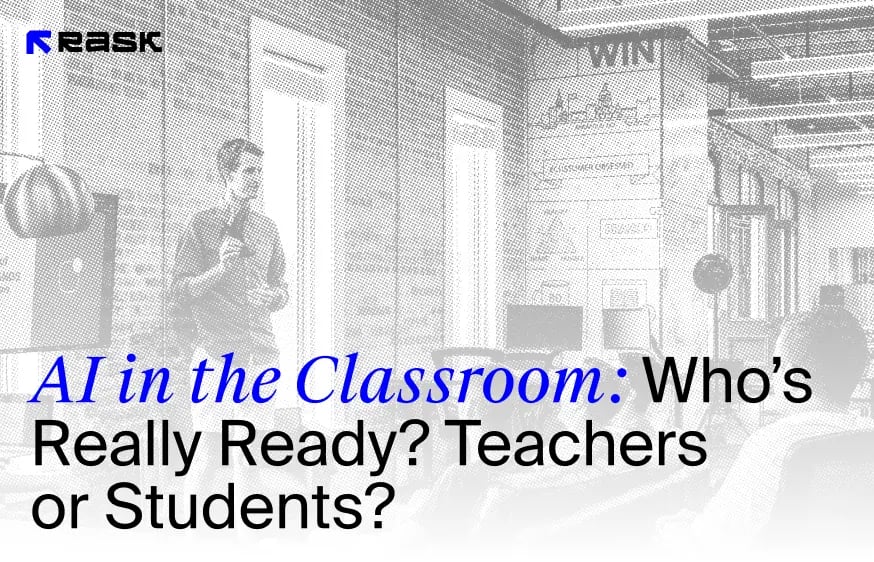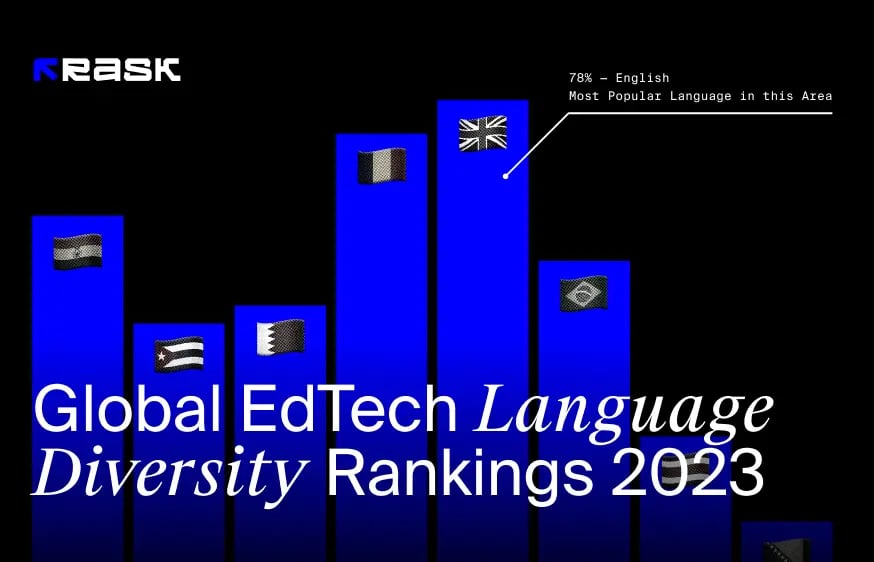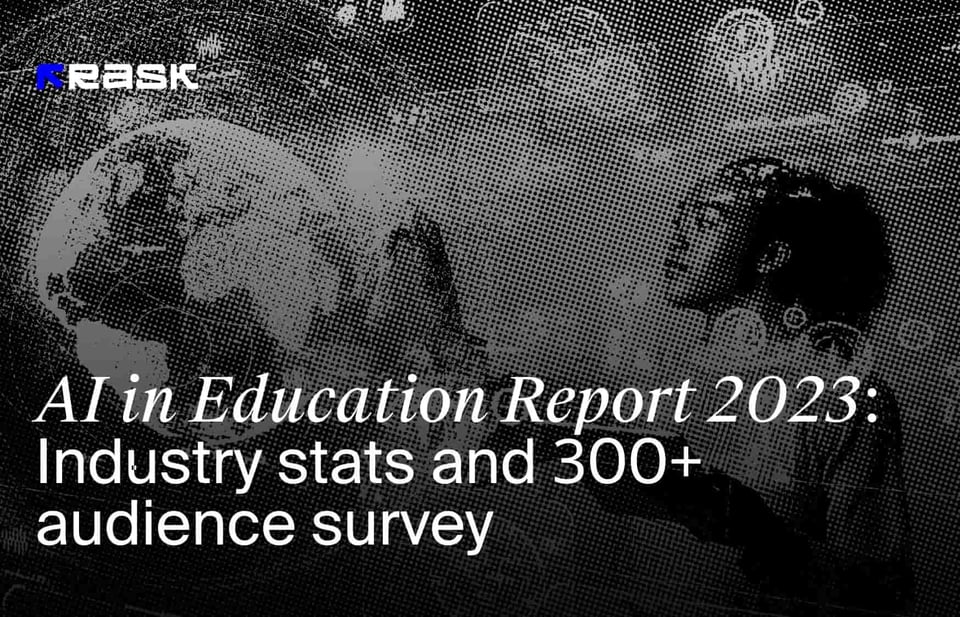AI Technology in Education Statistics 2024: Report and 300+ Audience Survey

Explore the latest ai in education statistics to understand trends in the AI education market. Examine data on how people perceive AI-generated learning content compared to human-created materials.. Learn how to use AI in education with input from 30+ experts and our AI tools overview.
Introduction
Does AI-generated content in education impact audience engagement?
We conducted a survey with over 300 users to better understand user engagement in AI-generated videos compared to human-created videos, with a focus on educational videos.
As the online education market continues to grow rapidly, with a projected reach of $166.60bn by the end of 2023, we wanted to dig deeper into the potential of AI as a tool to make learning more personalized, accessible and inclusive. Our research compares audience engagement in synthetically-created learning videos to human-created learning videos, and evaluates the benefits of investing in new content creation technologies.
Contents
Does AI-generated content impact audience engagement?
We conducted a survey with over 300 users to better understand user engagement in AI-generated videos compared to human-created videos, with a focus on educational videos.
As the online education market continues to grow rapidly, with a projected reach of $166.60bn by 2023, we wanted to dig deeper into the potential of AI as a tool to make learning more personalized, accessible and inclusive. Our research compares audience engagement in synthetically-created learning videos to human-created learning videos, and evaluates the benefits of investing in new content creation technologies.

Biggest findings
1. The e-learning market is a multibillion dollar industry that is growing globally. One of its biggest market drivers is artificial intelligence technology. With the generative AI market projected to grow at a rate of 76.9% per year, the AI market in education is expected to reach an impressive $80 billion by 2032.
2. Our survey of more than 300 audience members showed that AI-generated content is equally as engaging as human-created content. While a certain degree of FUD (fear, uncertainty, and doubt) remains–in addition to some technological limitations–what this research reveals is that AI is well-equipped to maintain the accessibility and personalization of educational content, without losing the audience engagement game.
Fun (but serious) fact: Surprisingly, even though participants recognized that one video was AI-generated, they were more focused on the topic of the content than how that content was created.

AI in Education Statistics:Market Size and Global Trends
Artificial intelligence (AI) is playing a significant role in transforming the e-learning industry, from automating grading to creating personalized learning paths and content.
The AI market has witnessed a compound annual growth rate (CAGR) of 76.9% since 2018.
The generative AI market is expected to grow from $11.3 billion in 2023 to $51.8 billion by 2028, at 76.9% CAGR.
Generative AI in the business market is predicted to reach $20.9 billion by 2032 from $1.2 billion in 2022, with 33.5% CAGR (2023-2032).
The AI in education market had a global valuation of USD 1.82 billion in 2021 and is projected to grow at a CAGR of 36.0% from 2022 to 2030.
Generative AI is Disrupting Business
Great Majority of Businesses That Applied AI See Costs Savings And Revenue Growth, By McKinsey



Global Market Insights forecasts that the AI market in education will be worth more than $80 billion by 2030 with a 20% CAGR from 2023 to 2032.
The Markets and Markets report estimates that the global use of AI in education will increase to $3,683.5 million by 2023.
E-Learning Goes High-Tech with IoT and AI: Market Set to Reach $239.30bn by 2027

Secondly, it’s about cost efficiency – how we can do more with less, how we can create better content, faster learning, in a more efficient way.

Audience Survey: Is AI-Generated Educational Content As Engaging as Human-Created?
Does AI-powered content creation affect user engagement? Studies compare engagement in AI-generated and human-created educational videos.
In April 2023, University College London scientists compared learning performance in traditional instructor videos and AI-generated synthetic videos (character-generated with Synthesia.io) in online learning. Both types of videos showed significant improvement in learning with no statistical difference between them. Learners also perceived no differences between the traditionally-created and synthetically-created videos.
We conducted a small experiment to stimulate a conversation about the impact of AI-generated videos on audience engagement. Our experiment aimed to provide insights into how AI-generated synthetic videos affect user engagement and if there are any differences in user engagement when watching AI-generated or human-created videos.
Methodology
Survey participants were randomly assigned to one of two groups to watch micro-learning videos on the topic: "Why do you hate the sound of your voice?" One group watched a video created by AsapSCIENCE, while the other group watched
Audience engagement comparison: our research method
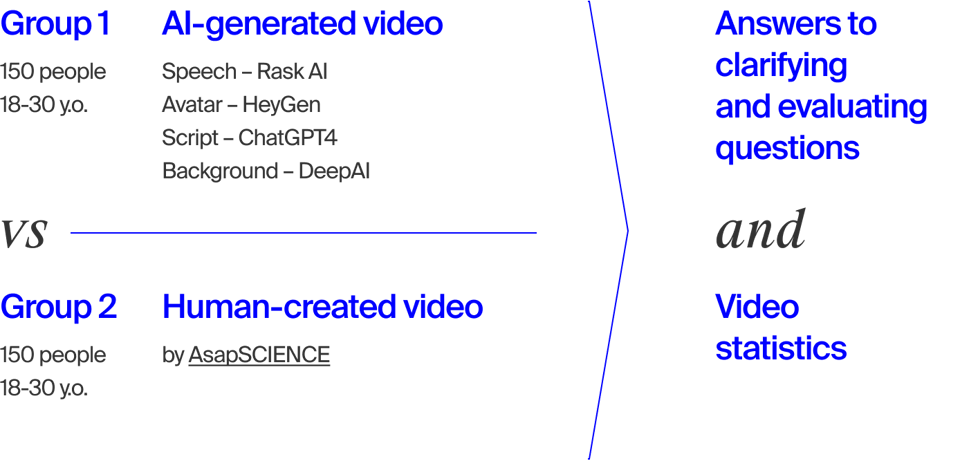
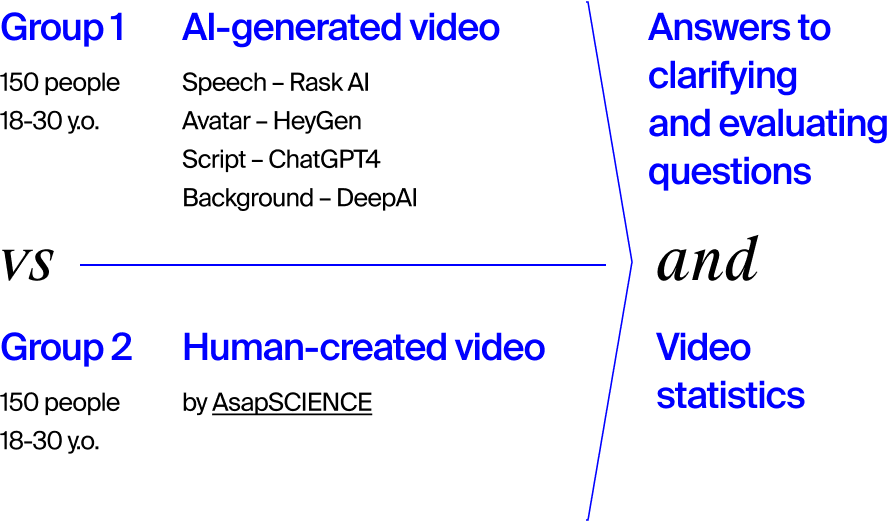
Here are the two videos that we compared:
Human-created micro learning video (by AsapSCIENCE)

AI-generated micro learning video

We used the following tools to create a synthetic learning video:
ChatGPT4 to generate the script;
Rask AI for the voice (text-to-speech);
HeyGen to create a “teacher”-avatar;
And DeepAI for the video background (text-to-image).
Our survey aimed to gain an understanding of participants' perceptions, thoughts, feelings, and behaviors during and after watching the educational videos.
It is important to mention that our experiment had some limitations, such as the small amount of test material and its limited variety. Additionally, the educational content we used may not appeal to everyone.
Who Wins the Engagement Game: AI or Human-Made Educational Videos?
The results revealed there were no significant differences in user engagement levels between human-created and AI-generated content
Both videos got positive feedback regarding the topic of the video; users found it both interesting and insightful.
Both videos received some negative comments about specific facts being left out. For example, the fact that a microphone does not pick up the low tones of the voice was not mentioned in either video. Criticisms of the videos were of about the same frequency which demonstrates that users were more engaged in the content itself than how the content was made.
Negative comments indicate a high level of engagement.
Surprisingly, even though participants recognized that one video was AI-generated, they focused more on the topic and less on the way it was created. Only 33% of participants expressed an opinion on AI generation.
Was the video informative and valuable?
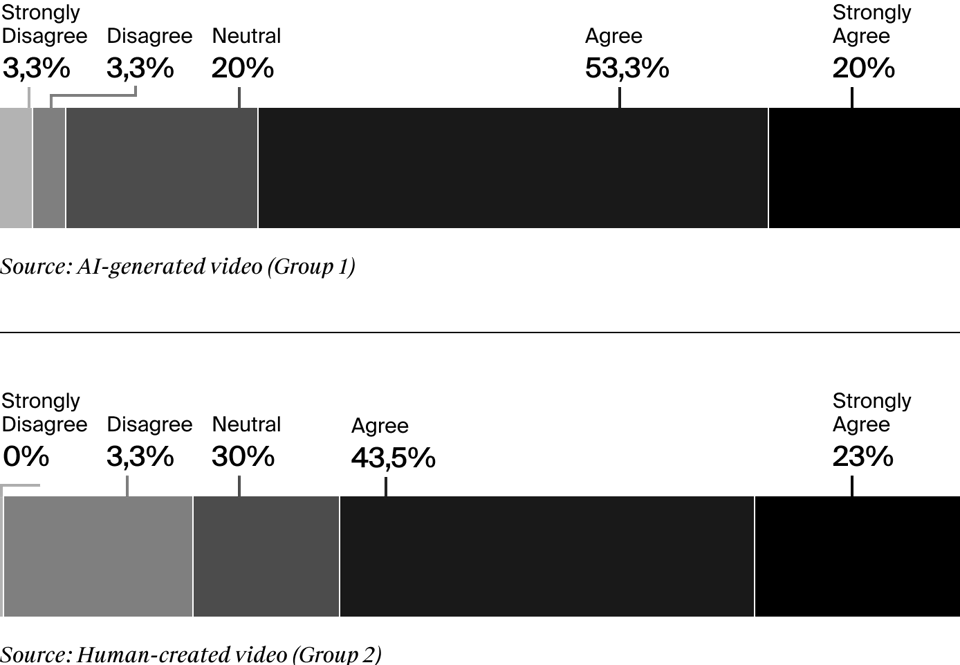
How likely are you to share this video with friends or family?
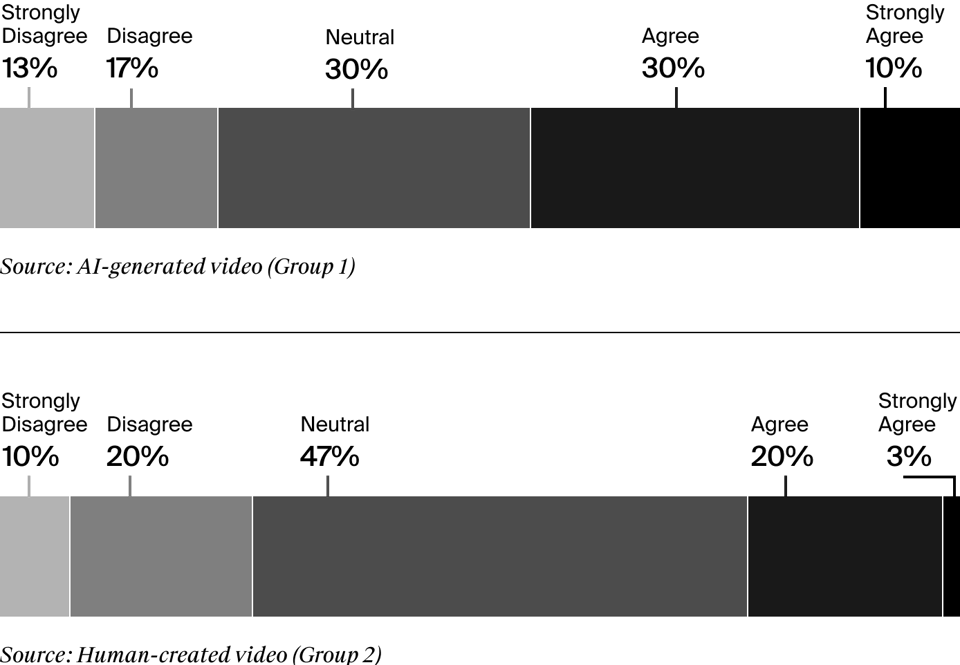
The Video Engaging and Kept Your Attention?
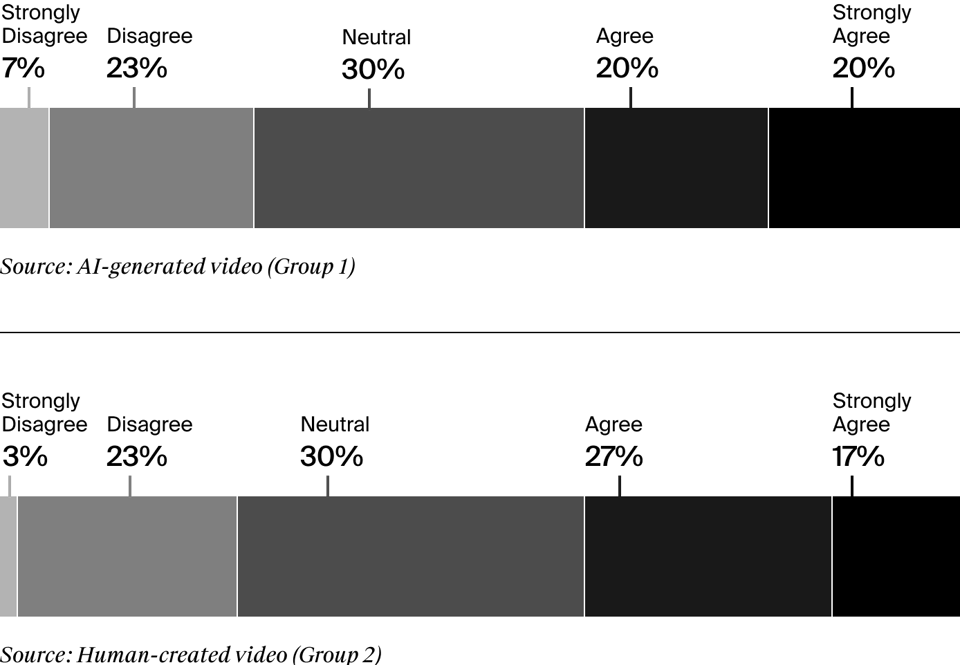
The video inspired me to comment, share or watch something similar?
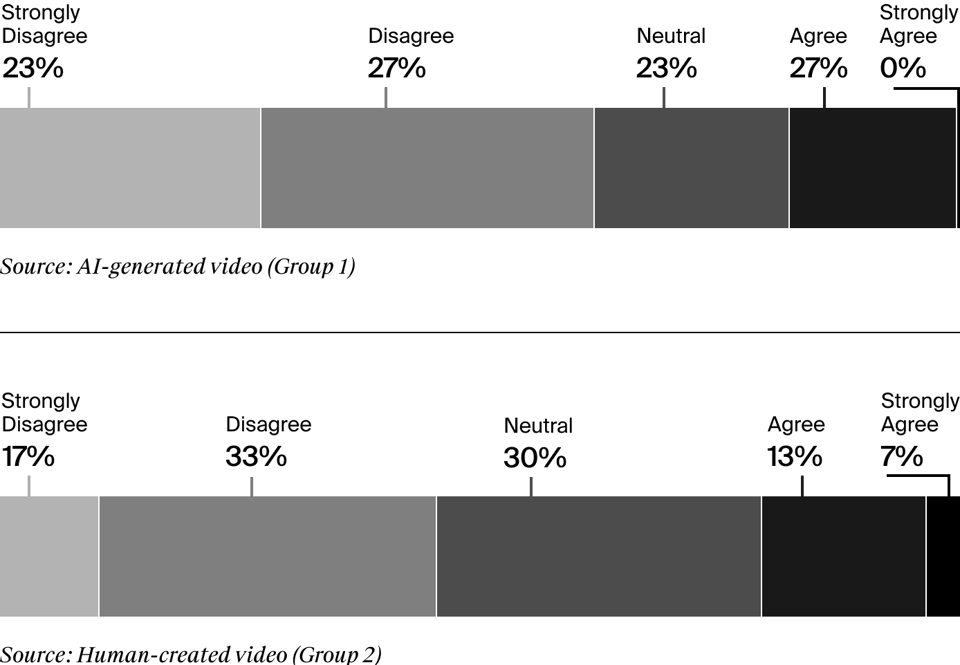
How likely are you to watch something else from the same author?
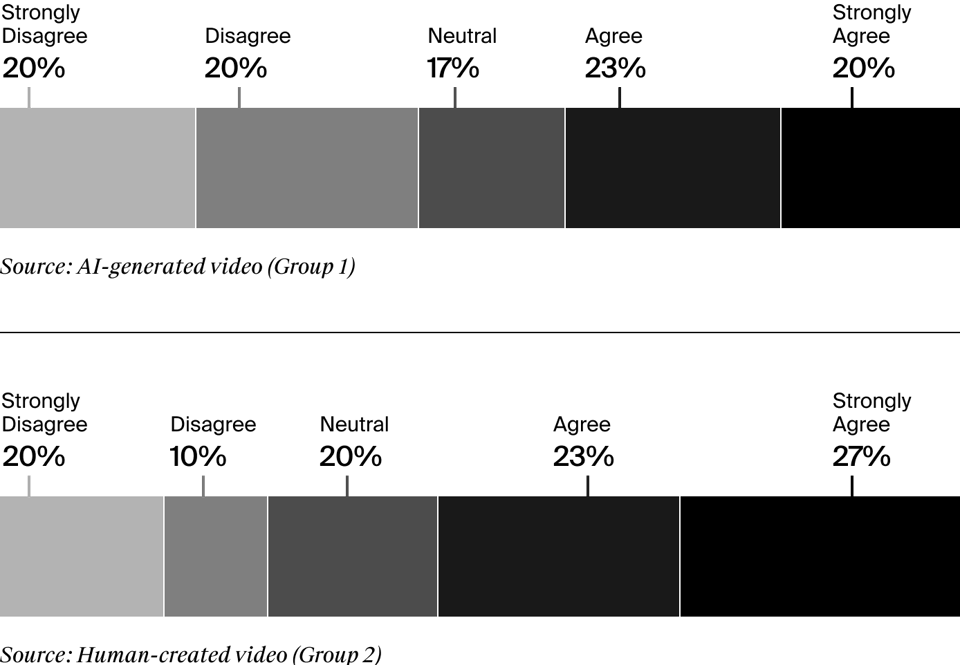
How do people feel about watching AI-generated educational content?
User perception of human-generated and AI-generated educational videos
Upon closer look, 90% of audience members did not express any negativity towards video synthesis with AI. In fact, 67% didn't even mention the AI aspect as they were more interested in the content of the video itself.
25% of users were completely satisfied with the video and had no desire to make any changes. More than 73% found the video content interesting and valuable, while 43% stated they would like to watch other videos from the same creator.
Additionally, 13% showed great enthusiasm for AI after watching the video and expressed an interest in learning more about the field.
These findings don't suggest that AI is superior to humans, rather they highlight that AI-generated videos can be an efficient way to streamline processes and cut costs in certain scenarios and for specific audiences.
Quotes from the audience survey:
Is there anything you would change?
“No. I think it was informative and concise at the same time.”
Would you like to watch anything similar? Why?
“Yes, it was short and informative. I liked the way it was presented.”
If you were recommending this video to someone else, how would you describe it?
"Look what I’ve discovered. It's quite interesting!”
People are actually fascinated by the fact that video was created with AI
“It might be controversial, but I like that it's made using AI, it looks lively and interesting, and makes me wonder when we won't be able to see AI”
“Damn, now I have to track AI progress, need to make my For you page show more videos like this”

Will AI Replace Teachers and Bloggers? AI Limitations in Educational Video Content
AI-generated videos are not perfect: 13% of users didn’t like the voice, while 10% of users expressed distrust
“I find his voice kind of boring” and “The tone of the speaker was too monotonous” were some of the negative comments from audience members. This shows that AI still needs to evolve and improve, especially in terms of communicating emotions.
Despite the majority of respondents being open to AI, a significant minority (10%) showed some level of skepticism and opposition toward its use.

It's no secret that AI can cause some severe FUD (fear, uncertainty, and doubt). While many embraced the experience, some audience members weren't as excited about the video being made by AI, with comments including: "The content is interesting but I don't like that it's made using AI." The key to easing these concerns is transparency and education about how AI works, its benefits, and its limitations. It's time for AI companies to step up and address these concerns head-on.
FUD* is everywhere


Interestingly, KPMG’s recent research revealed two out of five people don’t know that the apps they use are powered by AI. In addition, it suggests that 45% of people are not aware that AI is used in social media. These insights prove the importance of AI education; individuals need access to more information in order to understand that AI is just a new tool, before they can learn how to use it and benefit from it.


How To Use AI in Education: The Best AI Tools

1. Personalized learning: AI enables personalized learning by tailoring the educational experience to each student.
The following list includes AI-powered platforms and smart LMS (learning management systems) which are helping to build more personalized learning opportunities:
Riid – student performance analysis, knowledge gaps identification, and customized learning content delivery
Docebo – learning progress tracking, knowledge assessment, and tailored learning experiences
AcademyOcean – adaptive learning paths, personalized content recommendations, and real-time feedback for learners
Tes – adaptive assessments, AI-based content recommendations, and learning analytics to support individualized learning experiences
ExpertusOne – advanced analytics, AI-driven content curation, and personalized learning pathways

2. Improved accessibility:
AI can make education more accessible for learners worldwide regardless of language, location, or physical abilities. AI-powered language translation tools break down language barriers, while video transcription tools provide captions and subtitles for students who are deaf or hard of hearing. AI-powered image recognition tools provide alt-text descriptions for visually impaired students, making visual content accessible to all.
AI tools to improve accessibility:
Rask.ai – video localization tool: translation, dubbing, subtitling, voice-over, lipsync
Slait School – ASL learning with AI tutor
3. Cost savings:
AI can help cut production costs for educational institutions and publishers. For example, an AI-powered content creation tool could help generate learning materials at a lower cost than traditional methods.
AI tools for cost savings:
Chat GPT – generation of course plans, test items, grammar correction
Quizgecko – converting any text, document or URL into an interactive quiz
Quizlet – flashcards and games generation for learning
Brask.ai, Synthesia.io and other audio/video generation and translation AI
4. Improved customer experience:
The customer experience can be improved by providing personalized recommendations and support. For example, an AI-powered chatbot could assist students with questions and provide targeted resources based on their individual needs.
AI tools to improve customer experience:
Chat GPT, for example, is being used by Duolinguo for:
Chat GPT, for example, is being used by Duolinguo for:
Roleplay feature to practice conversations with Chat GPT 4;
Explain My Answer feature to better understand what was right and wrong in an answer, and to get some examples and further explanation.
Levity to categorize support tickets
5. Predictive analytics:
Institutions can better understand their students and anticipate their needs. For example, an AI-powered analytics tool could help predict which students may be at risk of dropping out and provide targeted interventions to keep them on track.
Folio3 – predictive analytics for business optimization
Adobe Analytics – advanced data analysis and insights for marketing
AWS – cloud-based predictive analytics platform for scalable solutions
6. Empowering teachers:
AI can help empower teachers, enabling them to focus more on pedagogy and less on technical tasks. For example, an AI-powered grading tool could help automate grading and provide teachers with more time to spend on lesson planning and providing individualized support for their students.
AI-tools to empower teachers:
Essaygrader – which not only detects errors and gives feedback, but also has an AI detector
Gradescope – assessment administration
CourseAI – course plan creation assistance
AIs not only lead to cost savings, but give employees their time back


As the generative AI market continues to expand and the education market adopts AI technologies, obvious questions arise: "Does AI-generated content have an impact on user engagement?” “Should we be adopting AI-powered content creation tools and software?"
In conclusion
AI-generated content: Is it really worth the effort?
AI has the potential to revolutionize the education market, making it more accessible and personalized for learners worldwide. Our findings suggest that AI videos won't significantly impact engagement, which is a great news for cost cutting and improving the user experience as well as increasing accessibility, personalization and inclusivity.
However, our audience engagement experiment showed that the messaging and storytelling behind the content remains one of the most important factors, irrespective of the technology used to create it. AI requires a human touch and professional expertise to be truly effective; educational content will always require pedagogy and human input.







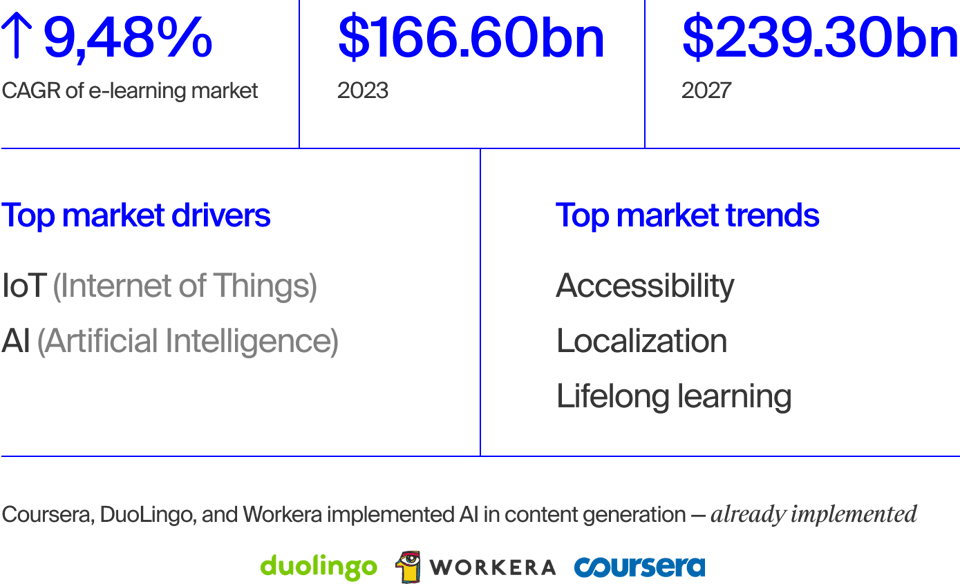
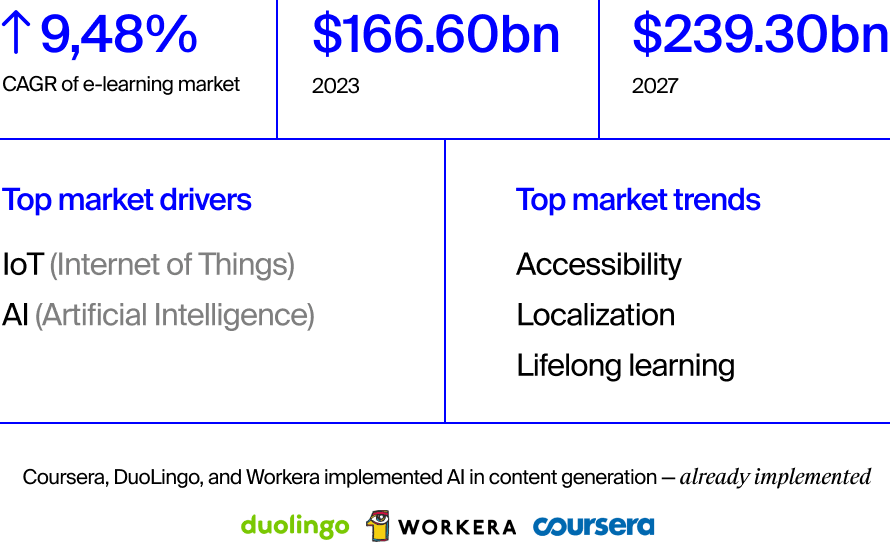

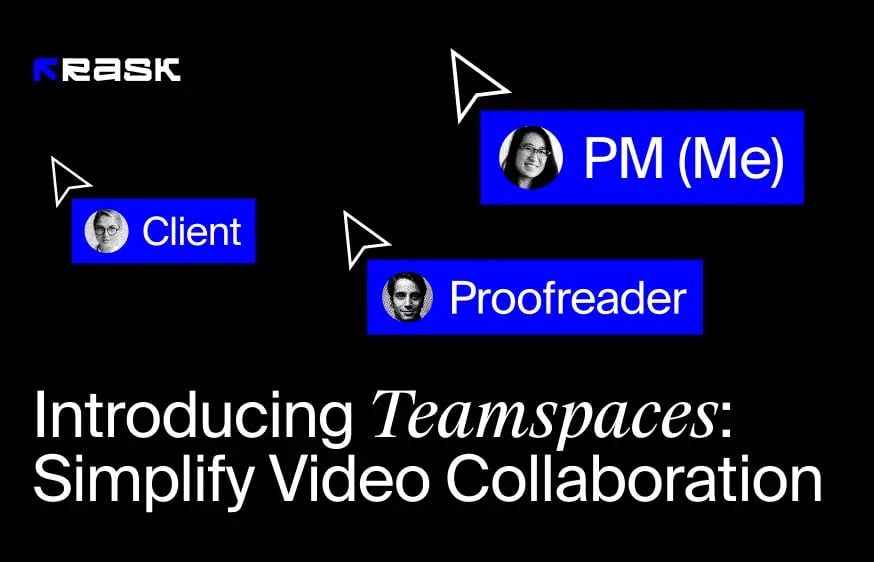
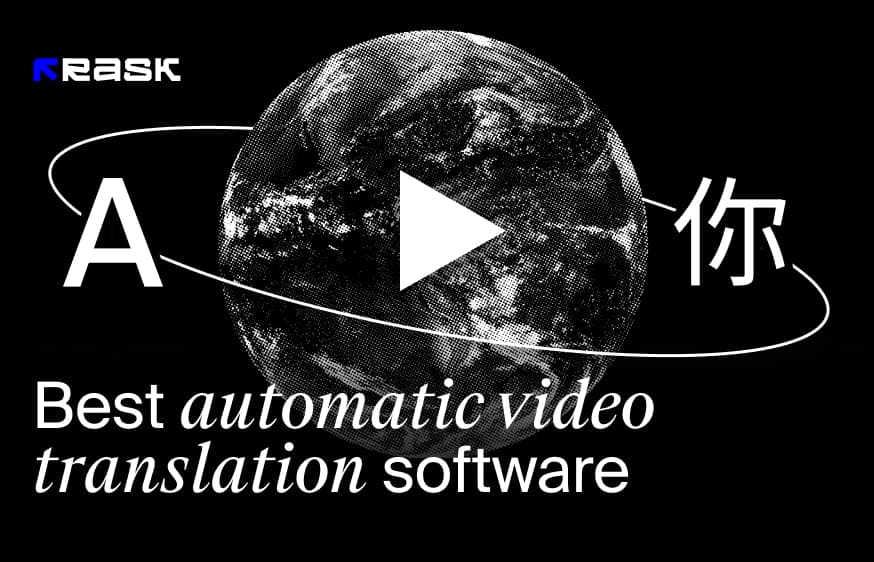
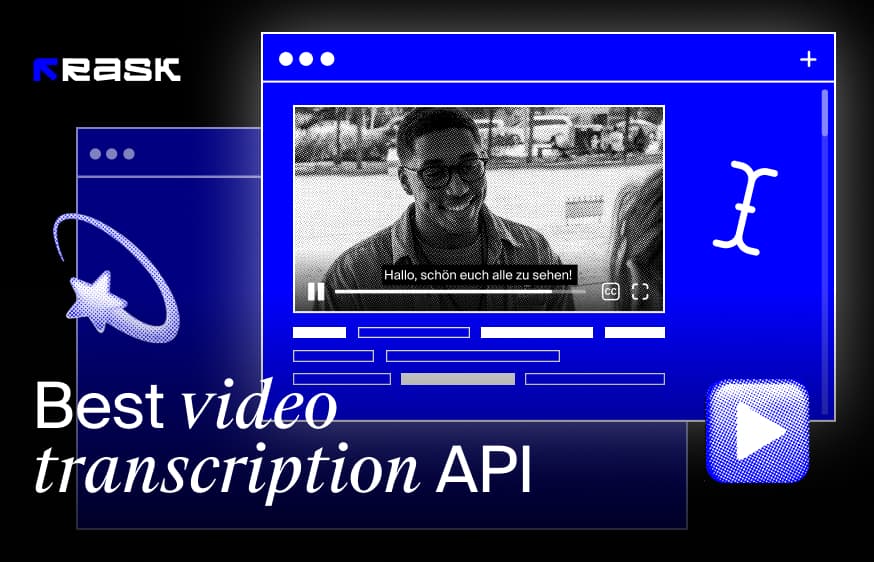
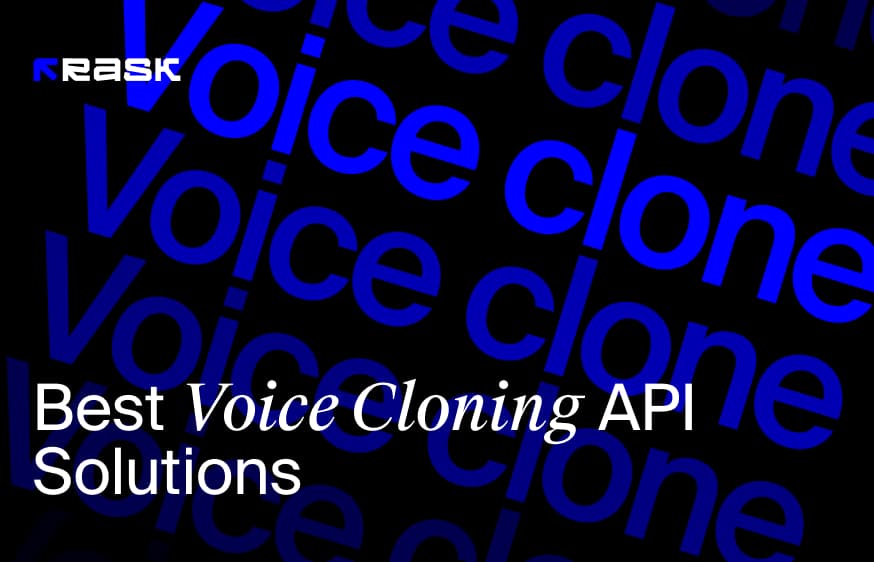
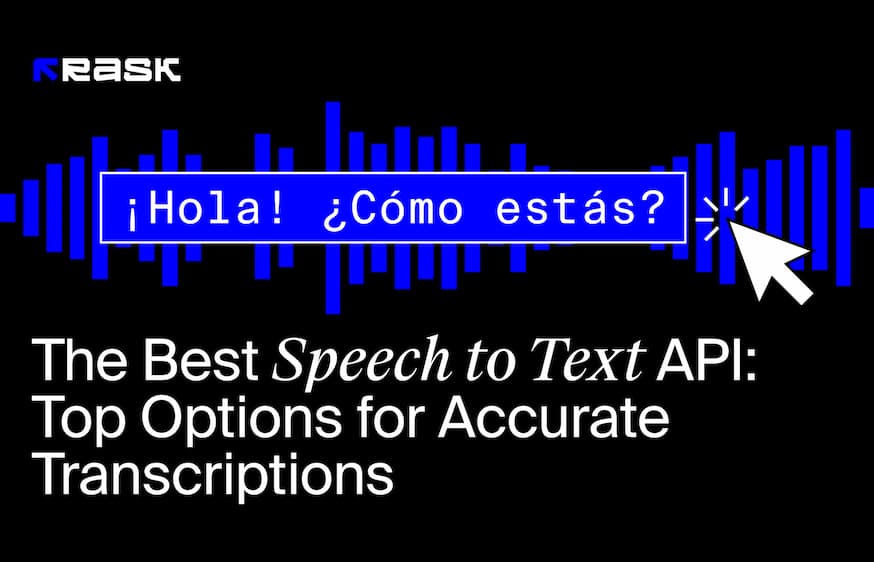
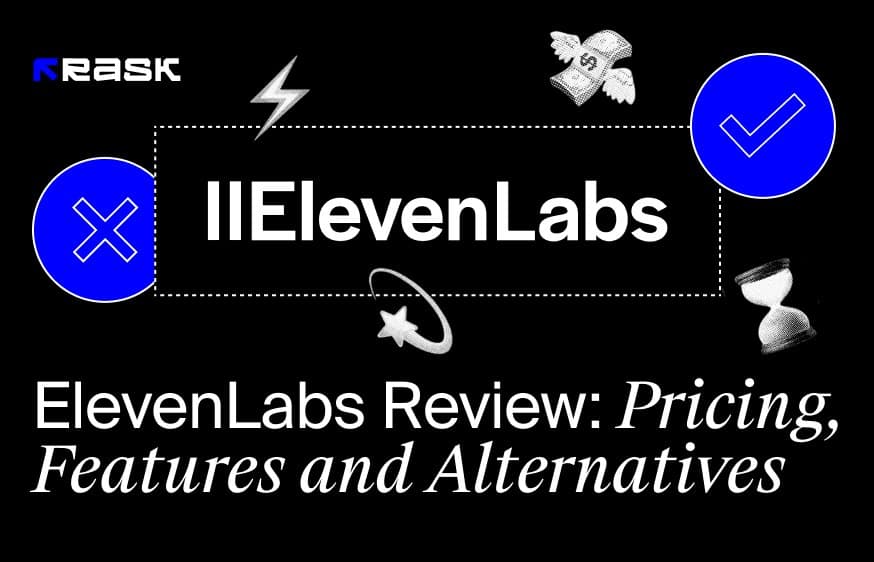
.jpg)
.webp)
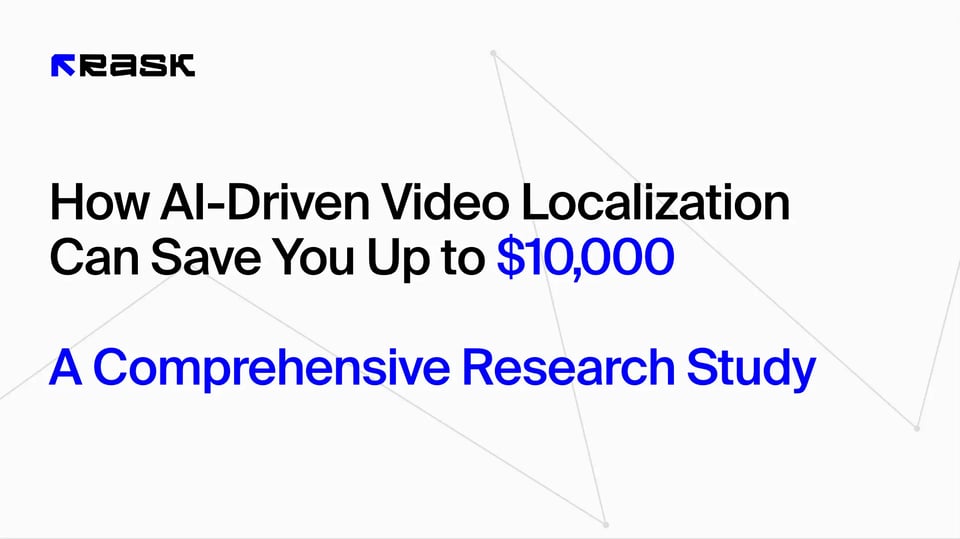
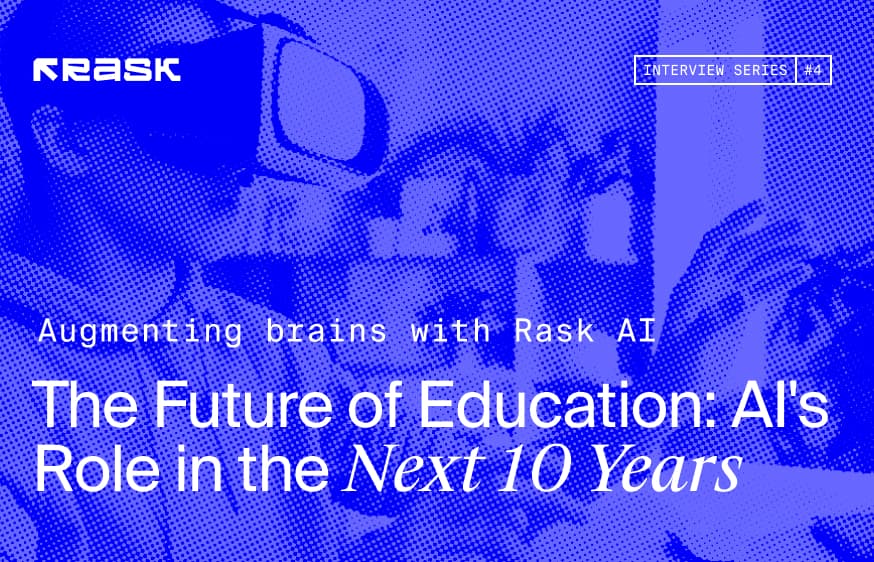
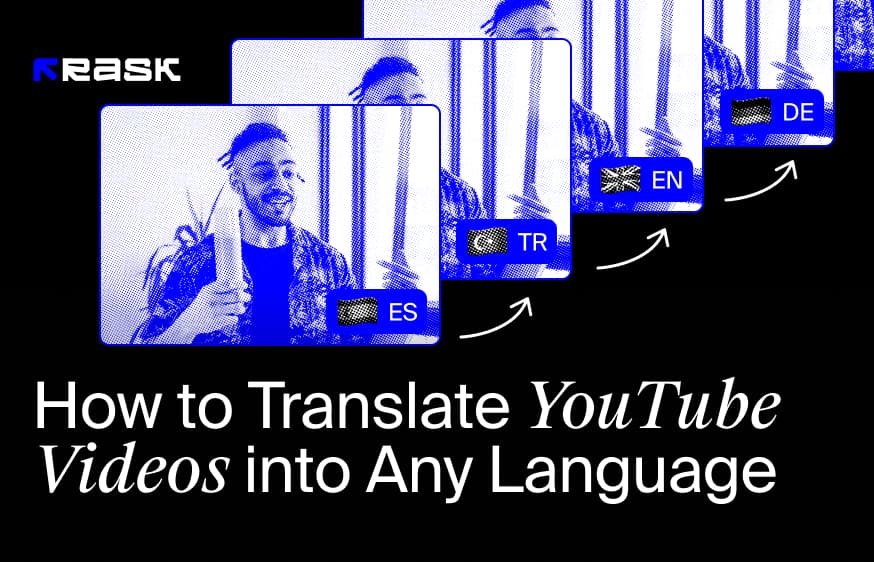
![8 Best Video Translator App for Content Creators [of 2024]](https://rask.ai/cdn-cgi/image/width=960,format=auto,fit=scale-down/https://cdn.prod.website-files.com/63d41bc99674c403e4a7cef7/6668a3dcd3175bd1d1c73c81_Best%20video%20translator%20apps%20cover.webp)
![Best AI Dubbing Software for Video Localization [of 2024]](https://rask.ai/cdn-cgi/image/width=960,format=auto,fit=scale-down/https://cdn.prod.website-files.com/63d41bc99674c403e4a7cef7/66685014f68137eb05c89c16_Cover.webp)

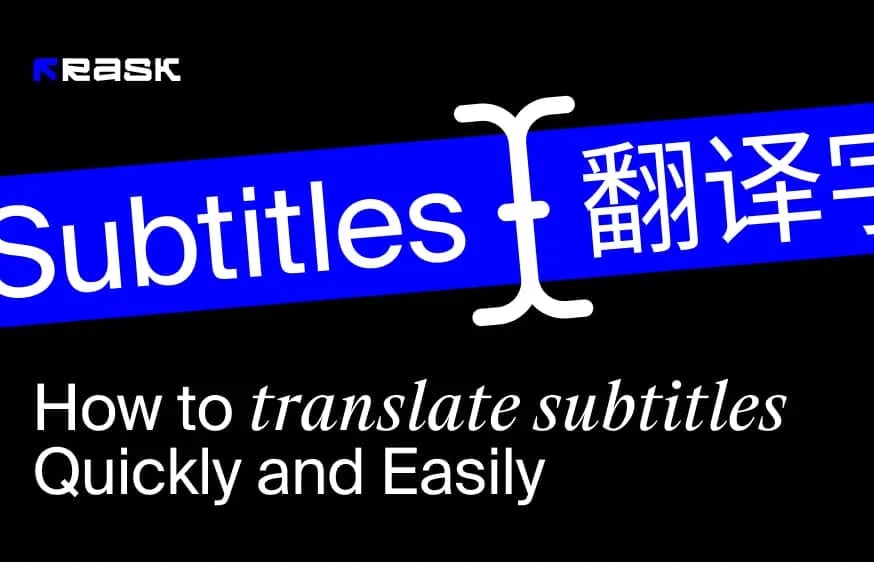
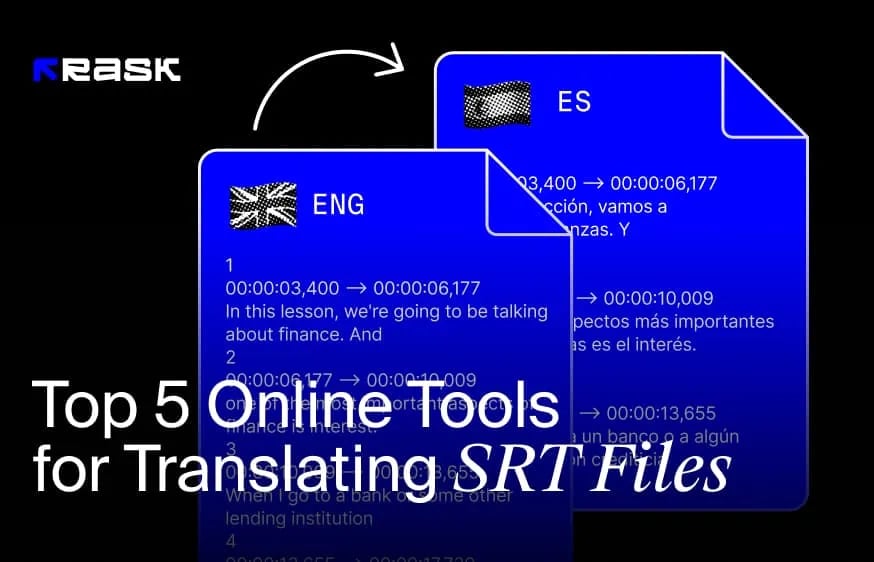
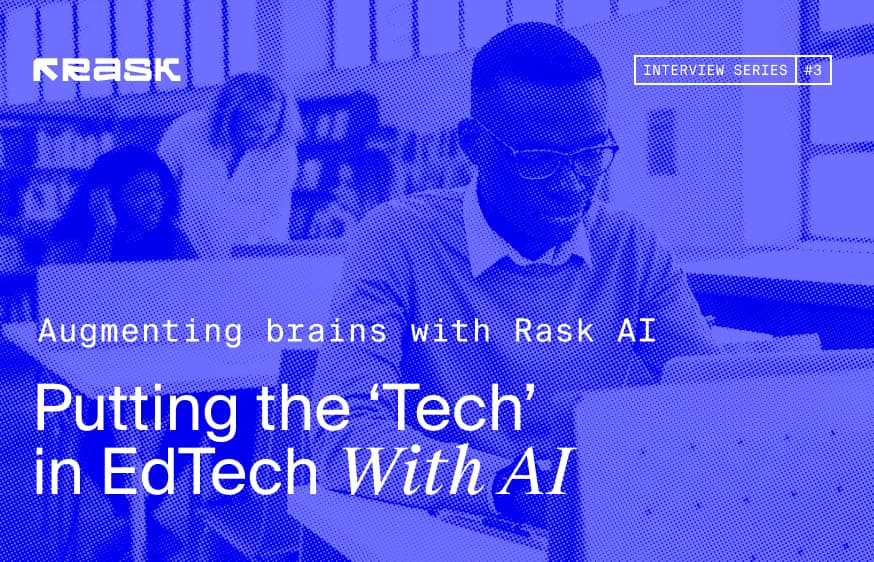
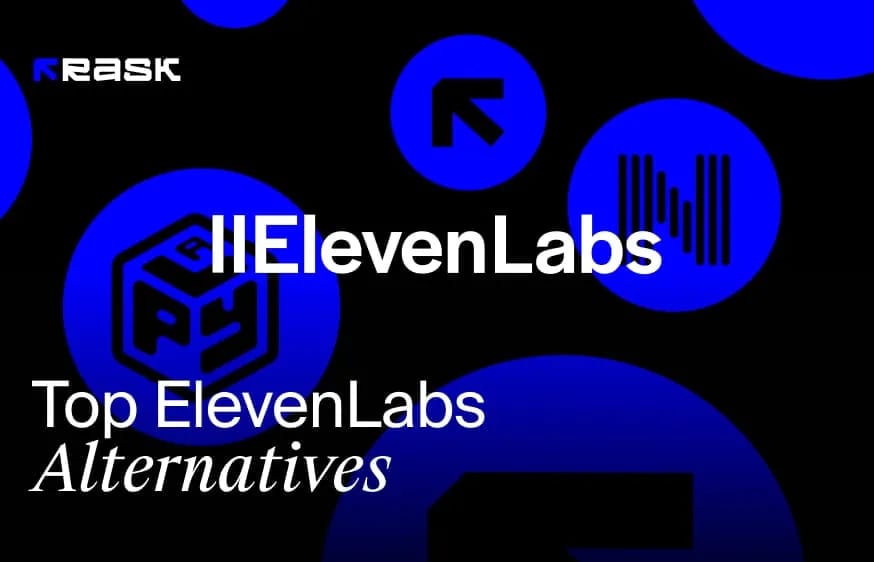
.webp)

